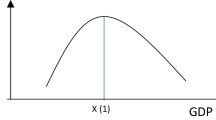Abstract
Jiangsu is one of the most developed regions in China. Its’ urbanization rate increased to 61.9 % in 2011, faster than the whole country level (51.27 %). Exploring the influence of urbanization on energy consumption in Jiangsu may help find the relationship between energy consumption and urbanization. The main results received in this paper are as follows. (1) Urbanization accelerated the produce energy consumption over the study period. The produce energy consumption jumped from 50.7 Mtce in 1995 to 166.6 Mtce in 2011. (2) Due to the rapid urbanization, the gap between residential energy consumption for urban and rural regions gradually has become wide since 2002. However, the gap in residential energy consumption per capita between urban and rural has changed narrow since 1995. (3) The grey relational degree between urbanization and office energy consumption is the biggest. However, the relational grade for construction energy consumption is relatively low. (4) The energy intensity effect plays an important role in decreasing produce energy consumption at the aggregate level, followed by the economic structure effect. The economic activity density effect, urbanization rate effect and population effect are found to be primarily responsible for driving produce energy consumption growth over the study period.









Similar content being viewed by others
References
Al-mulali U, Fereidouni HG, Lee JYM, Sab CNBC (2013) Exploring the relationship between urbanization, energy consumption, and CO2 emission in MENA countries. Renew Sustain Energy Rev 23:107–112
Burney NA (1995) Socioeconomic development and electricity consumption: a cross country analysis using the random coefficient method. Energy Econ 17(3):185–195
CESY (China Energy Statistical Yearbook), 1997, 2000, 2003, 2004. 2005, 2006, 2007, 2008, 2009, 2010, 2011, 2012. National Bureau of Statistics of China, National Development and Reform Commission
Chen Y, Li X, Zheng Y, Guang Y, Liu X (2011) Estimating the relationship between urban forms and energy consumption: a case study in the Pearl River Delta, 2005–2008. Landsc Urb Plan 102(1):33–42
Deng JL (1990) A course on grey system theory. HUST Press, Wuhan
Ewing R, Rong F (2008) The impact of urban form on U.S. residential energy use. Hous Policy Debate 19(1):1–30
Fan Y, Xia Y (2011) Exploring energy consumption and demand in China. Energy 40:23–30
Feng ZH, Zou LL, Wei YM (2011) The impact of household consumption on energy use and CO2 emissions in China. Energy 36:656–670
Halicioglu F (2007) Residential electricity demand dynamics in Turkey. Energy Econ 29(2):199–210
Jones DW (1991) How urbanization affects energy use in developing countries. Energy Policy 19(7):621–630
JSSY (Jiangsu Statistical Yearbook), 2012. National Bureau of Statistics of China
Kose E, Burmaoglu S, Kabak M (2011) Grey relational analysis between energy consumption and economic growth. Grey Syst: Theory Appl 3:291–304
Lariviere I, Lafrance G (1999) Modeling the electricity consumption of cities: effect of urban density. Energy Econ 21(1):53–66
Lenzen M, Wier M, Cohen C, Hayami H, Pachauri S, Schaeffer R (2006) A comparative multivariate analysis of household energy requirements in Australia, Brazil, Denmark, India and Japan. Energy 31(2–3):181–207
Liu YB (2009) Exploring the relationship between urbanization and energy consumption in China using ARDL (autoregressive distributed lag) and FDM (factor decomposition model). Energy 34:1846–1854
Liu YB, Xie YC (2013) Asymmetric adjustment of the dynamic relationship between energy intensity and urbanization in China. Energy Econ 36:43–54
O’Neill BC, Ren XL, Jiang LW, Dalton M (2012) The effect of urbanization on energy use in India and China in the iPETS model. Energy Econ 34:S339–S345
Parikh V, Shukla J (1995) Urbanization, energy use and greenhouse effects in economic development: results from across-national study of developing countries. Glob Environ Change 5(2):87–103
Permana AS, Perera R, Kumar S (2008) Understanding energy consumption pattern of households in different urban development forms: a comparative study in Bandung City, Indonesia. Energy Policy 36(11):4287–4297
Phetkeo P, Shinji K (2010) Does urbanization lead to less energy use and lower CO2 emissions? A cross-country analysis. Ecol Econ 70:434–444
Su B, Ang BW (2012) Structural decomposition analysis applied to energy and emissions: some methodological developments. Energy Econ 34:177–188
Wang Q (2014) Effects of urbanization on energy consumption in China. Energy Policy 65:332–339
Zhang M, Liu X, Wang WW, Zhou M (2013) Decomposition analysis of CO2 emissions from electricity generation in China. Energy Policy 52:159–165
Zhou W, Zhu B, Chen D, Griffy-Brown C, Ma Y, Fei W (2012) Energy consumption patterns in the process of China’s urbanization. Popul Environ 33(2–3):202–220
Acknowledgments
The authors gratefully acknowledge the financial support from the Fundamental Research Funds for the Central Universities (2013QNA11), the Philosophy and Social Science Foundation of Jiangsu Universities (2013SJD790061), the Natural Science Foundation of China (7140030441), and the Natural Science Foundation of Jiangsu Province (BK20130176).
Author information
Authors and Affiliations
Corresponding author
Rights and permissions
About this article
Cite this article
Zhang, M., Li, P. Analyzing the impact of urbanization on energy consumption in Jiangsu Province. Nat Hazards 76, 177–190 (2015). https://doi.org/10.1007/s11069-014-1479-7
Received:
Accepted:
Published:
Issue Date:
DOI: https://doi.org/10.1007/s11069-014-1479-7




